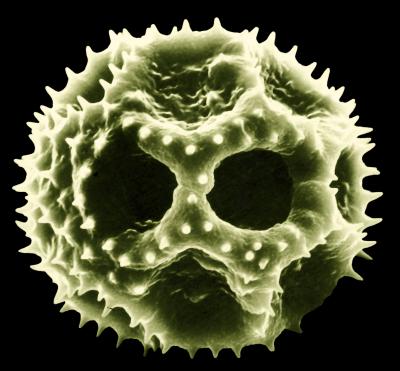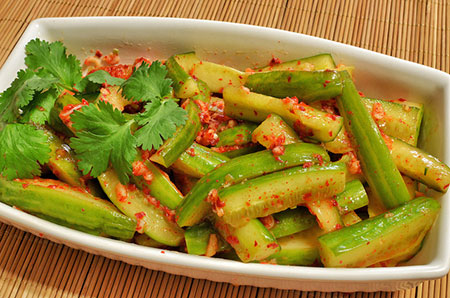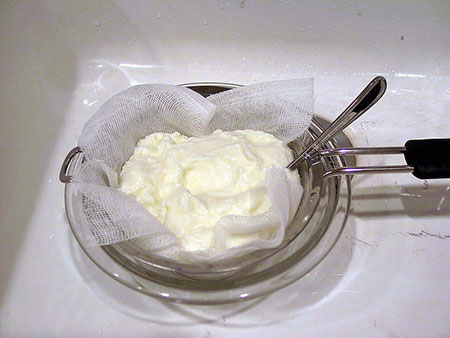|

by Andrew Chapple
Norwich BioScience
Institutes
November 26, 2013
from
Eurekalert Website
Researchers have a
nose for how probiotics could affect hay fever
A study has shown that a daily probiotic
drink changed how cells lining the nasal passages of hay fever
sufferers reacted to a single out-of-season challenge.
However, it did not lead to significant
changes in hay fever symptoms, although this challenge test may not
have accurately represented natural allergen exposure.

This is pollen from a
dandelion.
Our immune system must distinguish between "friends" that can be
beneficial to our health and "foes" that can have harmful effects.
There is now a growing body of evidence
that the gut microbiota, the trillions of bacteria that live in our
gut, influences that recognition. When it fails an immune response
occurs.
This is the case with hay fever, or
seasonal allergic rhinitis, when the immune system reacts to pollen
or fungal spores.
Previously, a research team at the Institute of Food Research
(IFR) found that taking a drink containing the probiotic bacterium
Lactobacillus casei changed how our immune system responds to grass
pollen, measured through changes in molecules produced by the immune
system.
A new study, published in the journal PLOS ONE (Oral
Delivery of a Probiotic Induced Changes at the Nasal Mucosa of
Seasonal Allergic Rhinitis Subjects after Local Allergen Challenge -
A Randomised Clinical Trial), shows for the first time
how these probiotics can interact
with cells in our gut to produce systematic changes in cells lining
our nasal cavity.
Funded by Yakult and the Biotechnology and Biological Sciences
Research Council (BBSRC), clinicians and scientists at IFR and
the University of East Anglia (UEA) on the Norwich Research Park
gave 60 hay fever sufferers daily drinks for 16 weeks, outside of
the hay fever season. One group was given a drink containing
Lactobacillus casei Shirota, and the other group received very
similar drinks without the probiotic.
The study was double-blinded and placebo
controlled, so neither the volunteers nor the scientists knew which
group was receiving the probiotic.
Samples were taken from the volunteers'
nasal cavities and blood, both before and after being challenged
with pollen to trigger their allergy. This was then repeated at the
end of the 16-week intervention. Clinical measurements of the
symptoms of hay fever were also recorded.
Volunteers who received the probiotic drink saw changes in allergic
inflammation in their nasal lining, as well as changes in their
blood, that are associated with immune responses. This is strong
evidence of how the gut microbiota can influence cells of the gut
lining, and have a systematic influence on our bodies and distant
cells, such as those lining our nasal passages.
But despite this, the probiotic had no
detectable effect on the symptoms of hay fever.
Hay fever is a complicated condition to assess, and mimic in a
clinical setting. The researchers used a single allergy challenge,
applied to the volunteers' nasal passage, to provide a standard,
reproducible test to help ensure all the subsequent results are
comparable.
In the real world hay fever is usually triggered by
longer term exposure to the allergen, variable in strength and
timing over a period of days or weeks.
The IFR researchers are now exploring
the possibility of carrying out a seasonal study to investigate
whether the changes in the nasal mucosa seen in this single
challenge study relate to changes in hay fever symptoms triggered by
a more realistic natural exposure to pollen.
Simplifying Probiotics
-
A Path to Improving Your Gut Health
-
by Anna Hunt
Staff Writer
October 2, 2013
from
WakingTimes Website

Billions of beneficial bacteria,
commonly referred to as probiotics, live in the human body.
These bacteria are part of what keeps
the body in balance in order to maintain overall good health. They
reside in the human digestive system, specifically the intestinal
tract also referred to as the gut, (as well as in the mouth, on the
skin, in the colon, etc), and are integral to gastrointestinal
functions.
Over recent years,
scientists are starting to discover that these microorganisms
also play a role in immunological, metabolic, and neurological
diseases.
Common Types of Probiotics
The best known of the probiotics are the
Lactobacilli.
There are a number of Lactobacilli
species that are especially effective in creating an overall balance
of the various microorganisms in the gut:
-
Lactobacillus delbrueckii subsp.
bulgaricus is found in naturally fermented foods and is also
used by the dairy industry to produce yogurt.
-
Lactobacillus acidophilus is
naturally-occurring in the human gastrointestinal tract.
Certain strains are often included in probiotic supplements
because they are believed to be able to survive
gastrointestinal transit, being resistant to bile, low pH,
and digestive enzymes.
-
Other common Lactobacilli
species include brevis, casei and sporogenes.
Other common probiotics include:
-
Bifidobacteria, which are one of
the major genera of probiotics found in the
gastrointestinal tract of mammals, including humans.
Various species are often used in the food industry.
-
Streptococci, which are often
known for being the main culprit of strep throat and pink
eye, although there are many non-pathogenic species that are
part of the human microbiome. Streptococci are used in the
production of Swiss cheese, reduced-fat cheese and yogurt.
-
Bacilli, which are found in
soils and in certain fermented foods, as for example kimchi.
Certain species of Bacilli, such as Bacillus pumilus, are
capable of degrading
bisphenol A, commonly known as BPA, which pollutes human
bodies due to plastics overuse.
Why are Probiotics Important?
Just as billions of beneficial bacteria
can live in the body, the gut is also filled with harmful bacteria.
The body needs probiotics to counteract
these harmful bacteria in order to enable the production of vitamins
and enzymes essential for healthy body function and prevent build-up
of carcinogenic toxins.
Artificial food additives,
GMOs in our
foods, chlorinated and
fluoridated water, and use of antibiotics are all detrimental to
healthy gut flora.
Gut Flora Accounts for up to 80% of our
Immunity
More Probiotics, Less Antibiotics
At a vaccine seminar, Dr. Michael Geta was part of a four
member panel answering questions from the audience.
One audience
member asked why infants are getting vaccinated before the age
of one when their immune systems aren’t developed enough for
vaccine immune responses.
The person on the panel to whom it was addressed, a Ph.D vaccine
advocate, surprised Geta when she told the questionnaire his
understanding was accurate. She explained that early scheduling
was a training exercise to start parents vaccinating sooner
since they might forget after the child reached one year.
The Ph.D, whose name was withheld by her request, went on to
explain how a county nurse had asked her to encourage parents to
get their kids vaccinated after one year of age because the ones
they got before then were worthless.
The Ph.D responded to that nurse
with “Yeah, I know.”
Audio clip:
Dr. Geta explains:
‘Infants in their first year
mostly depend on generalized, non-specific immunity,
including (hopefully) immunoglobulins from breast milk, to
protect their young bodies from infection.
They do not
produce antibodies of their own until about age one.’
Dr. Natasha Campbell-McBride,
author of Gut and Psychology Syndrome Book (GAPS book)
and creator of the GAPS diet goes further.
She is a UK pediatrician who
successfully treats autistic and other mentally and physically
dysfunctional children by nutritionally restoring gut flora. She
learned how by treating her own son’s autism.
She agrees that mother’s breast milk is crucial. But not all
mothers breast feed, and many who do may have other problems
that hamper the milk’s protection. According to Dr. McBride, the
problems begin with the mother’s intestinal flora.
The mother passes on her gut flora to her newborn. So the
mother’s gut flora strength and balance is critical. Most
mothers who were not breast fed initially and grew up on
standard American diets (SAD) while receiving vaccinations and
antibiotics have compromised gut flora.
Adequate probiotic and balanced gut flora accounts for up to 80%
of our immunity.
As part of parental planning, it makes sense to
maintain a good diet, take in probiotic foods and/or
supplements, avoid antibiotics and vaccinations, then breast
feed the child for at least a year. Interestingly, a recent
report says that breastfeeding could save 830,000 lives each
year.
Vaccinations and
antibiotics given to newborns and older
children only puts them at risk for debilitating long term
neurological reactions, among other issues.
If they escape
without the obvious immediate adverse reactions, their long term
immunity is often heavily impaired.
Source

Considering that many people follow a
Western diet high in processed foods, starches and meats, it is easy
for their gut to become unbalanced.
Scientists believe that lack of
balance of good and bad bacteria can lead to cancer, hypertension
and many other types of diseases. Furthermore, our bodies are increasingly
subjugated to chemicals from pesticides, herbicides and
industrialized products such as plastics (containing BPA and BPS).
Certain probiotics are able to handle these toxins better than our
own detoxification processes.
Natural Sources of Probiotics
Probiotics are readily available to you
in a variety of natural foods, including the following:
-
Kombucha
is an all natural fermented drink that is made of sweetened
black tea.
It is made using SCOBY - a symbiotic colony of
bacteria and yeast. Kombucha beverages are full of
probiotics and other healthy amino acids. You can purchase
kombucha drinks,
kombucha SCOBY or a
kombucha tea starter kit from various manufacturers.
If
you plan to make your own kombucha tea, consider that it
needs to be fermented to a specific pH of 2.5 to 3.0, or
it will not develop the beneficial nutrients or may
overburden the stomach.
Additionally,
Kombuchakamp.com is a great resource for all things
kombucha.
-
Yogurt
is made by bacterial fermentation of milk.
Yogurt can be made from cow
milk, goat milk, soy milk, nut milks such as almond milk,
and coconut milk. Most commercial dairy yogurts are made
with Lactobacillus delbrueckii subsp. bulgaricus and
Streptococcus thermophilus bacteria, and at times other
lactobacilli and bifidobacteria are added.
To offset the sourness of
yogurt, large amounts of sugar and artificial sweeteners are
often added to commercial yogurts, therefore look for
unsweetened natural yogurt or
learn to make your own.
-
Kefir
is a liquid yogurt-like fermented product, often made out of
cow or goat milk.
It is high in both Lactobacilli and Bifidobacteria probiotics.
Kefir is made with
kefir grains - also called kefir babies - which are a
combination of bacteria and yeasts. Kefir grains will also
ferment milk substitutes such as soy milk, rice milk, and
coconut milk, as well as other sugary liquids including
fruit juice,
coconut water, beer wort and ginger beer.
You can usually find kefir
drinks at your local health food store or
buy kefir grains to produce your own kefir drinks.
Kefir grains reproduce easily
and can be shared with friends.
-
Kimchi
is a fermented cabbage dish that originated in Korea and
comes in many different varieties but usually contains
vegetables such as napa cabbage, cucumbers, radishes and
scallions.
Kimchi contains many strains of
probiotics including Lactobacillus kimchii, Lactobacillus
brevis, and Bacillus pumilus. These bacteria are known to
help the body eliminate BPA and pesticides.
A variety of
Kimchi products can be purchased in stores, or you can
learn how to make kimchi at home.
-
Apple cider vinegar
is a vinegar made from cider or apple must, with yeast and
bacteria added to the liquid to facilitate the fermentation
process.
In addition to providing
probiotics, apple cider vinegar has many internal and
external health benefits, many of which are
listed here. When purchasing apple cider vinegar,
consider only
organic raw products.
This list is by no means complete - with
soy bean-based foods such as miso and natto also full of probiotics.
In addition to these specific foods, healthy soil is a great source
of probiotics, and hence a diet high in raw fruits and vegetables
grown in organic soil will provide the body with lots of healthy
bacteria.
Reducing processed foods and ingesting
more raw, organic produce will benefit your waistline in more than
one way!
Resource Books:
-
How to Make Probiotic Drinks for a Raw Food
Diet: Kefir, Kombucha, Ginger Beer, and Naturally Fermented
Ciders, Sodas, and Smoothies by
R.J. Ruppenthal
-
Delicious Probiotic Drinks: 75 Recipes for
Kombucha, Kefir, Ginger Beer, and Other Naturally Fermented
Drinks by Julia Mueller
-
Fermented Foods for Health: Use the Power of
Probiotic Foods to Improve Your Digestion, Strengthen Your
Immunity, and Prevent Illness by
Deirdre Rawlings
-
Mastering Fermentation: Recipes for Making
and Cooking with Fermented Foods
by Mary Karlin
Probiotic
Supplements
There are various different types of
probiotic supplements that you could buy at health food stores.
Look
for the following when buying a probiotic supplement:
-
At least 10 probiotic strains
-
High culture count with both
Lactobacilli (Lacto) and Bifidobacteria (Bifido) strains.
Some supplements refer to these as L’s and B’s.
-
Capsules and/or probiotic
strains that allow the supplement to resist stomach acid so
the probiotics are released into the intestinal tract.
-
Upwards of 15 Billion live
cultures per capsule. Consult your physician or holistic
practitioner on what live cultures count is right for you if
you are trying to address a specific physical issue or
illness, or need to supplement the use of antibiotics or
other prescription drugs.
-
Potency until time of
consumption, especially if you need to travel with your
probiotics and cannot refrigerate them.
-
No dairy, sugar, gluten, soy,
corn, casein, yeast, artificial colors, flavors,
preservatives or any genetically modified or engineered
ingredients.
|



